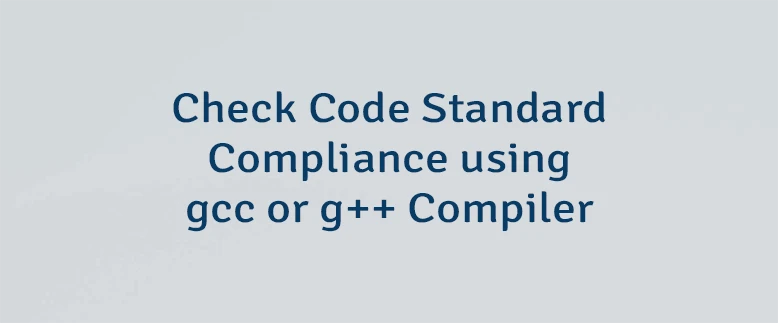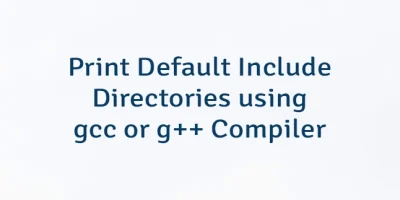When writing C or C++ code, it's essential to ensure the code complies with the intended language standard, especially if you're targeting environments that require strict compatibility (e.g., embedded systems, older toolchains, or cross-platform development). This tutorial shows how to check code standard compliance using gcc or g++ compiler.
Here's a quick overview of the key options we'll use:
-std=<standard>- sets the C or C++ language standard version.-fsyntax-only- tells the compiler to only check the code for syntax errors, without creating object files or executables.-Wpedantic- enables warnings for code that may be valid in GNU extensions but not strictly conforming to the selected standard.
C Language
Consider the following C code:
int main() {
_Alignas(32) float data[] = {1, 2, 3, 4, 5};
return 0;
}Compile with C11 standard:
gcc -std=c11 -fsyntax-only -Wpedantic main.cNo warnings or errors. The code is valid under the C11 standard, which introduced _Alignas.
Compile with C99 stardard:
gcc -std=c99 -fsyntax-only -Wpedantic main.cOutput:
main.c: In function ‘main’:
main.c:2:5: warning: ISO C99 does not support ‘_Alignas’ [-Wpedantic]
2 | _Alignas(32) float data[] = {1, 2, 3, 4, 5};
| ^~~~~~~~The warning indicates that _Alignas is not supported in C99.
C++ Language
Now consider this simple C++ example:
int main() {
auto data = 10;
return 0;
}Compile with C++11 standard:
g++ -std=c++11 -fsyntax-only -Wpedantic main.cppNo issues. auto type deduction is supported in C++11 and later.
Compile with C++98 standard:
g++ -std=c++98 -fsyntax-only -Wpedantic main.cppOutput:
main.cpp: In function ‘int main()’:
main.cpp:2:10: error: ‘data’ does not name a type
2 | auto data = 10;
| ^~~~The auto keyword in C++98 does not support type deduction, so this code fails to compile.




Leave a Comment
Cancel reply